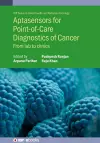
Aptasensors for Point-of-Care Diagnostics of Cancer
3 contributors - Hardback
£120.00
Dr. Arpana Parihar is currently working as a Women Scientist B at CSIR-Advanced Materials and Processes Research Institute (AMPRI), Bhopal, MP, India, under the scheme of DST-WoS-B awarded from Department of Science and Technology, Government of India. She did her PhD from Raja Rammana Centre for Advanced Technology, Indore under the ages of HBNI, Mumbai. Her doctoral research work involves the evaluation of tumor selectivity and photodynamic therapy (PDT) efficacy of Chlorin p6 through receptor-mediated targeted delivery. After her PhD, she worked as a post-doctoral researcher at CBME, IIT Delhi. At IITD her research work was to enhance the osteoinductive and osteoconductive properties of various implants made up of metals, ceramic, and polymers. Dr. Parihar has been awarded GATE, CSIR-NET, DST-WoS A, and WoS B fellowship. She has more than 7 years of research and teaching experience at various prestigious institutes. Her current research interest includes -fabrication of biosensors for early diagnosis of cancer, viral Infection, Stem cell Biology, Tissue engineering, Photodynamic therapy of cancer, Receptor-mediated targeting of tumor, Biosensors for early diagnosis of diseases, 3D cell culture, Expression of receptors, and cytokine, Molecular docking, Molecular dynamic simulations, Immunoinformatics, Codon usage bias. At present, she published 3 books in Elsevier and wrote several book chapters in esteemed publishers such as Springer, Elsevier, Taylor and Francis, etc. Her research work gained considerable attention in various international journals and conferences. Dr. Khan is currently working as Principal Scientist at Microfluidics & MEMS Centre, CSIR-Advanced Materials and Processes Research Institute (AMPRI), Bhopal - 462026, MP, India. His current research on Bio-molecular separation, including sample preparation and detection, Microchip based separation under the concept of lab-on-a-chip and electrochemical biosensor integrated with microfluidics clinical applications. He has more than 15 years of R&D experience in CSIR & other academics R&D Institutes such as in Analytical Chemistry Group, CSIR-NEIST, Jorhat, Assam, CSIR-NPL, New Delhi and CSIR-AMPRI, Bhopal Govt. of India, respectively. He received his MSc degree in Inorganic Chemistry and Ph.D. in Physical Chemistry from Jamia Millia Islamia, Central University, New Delhi, India, in 2002 & 2005, respectively. After that, he worked as a Postdoctoral Fellow at the “Sensor Research laboratory Department of Chemistry, University of the Western Cape, Cape Town, South Africa, in the year 2005-06 and also worked as a Fast-Track Young Scientist at CSIR-National Physical Laboratory, New Delhi Govt. of India. Dr. Khan is involved in synthesizing novel materials to fabricate electrochemical biosensors to detect target disease risk biomarker for health care monitoring. Dr. Khan is also engaged in other external project funding by the National & International collaborative project, Indo-Czech Republic & Indo-Russia. He is awarded the reputed BOYSCAST fellowship under the BOYSCAST fellowship scheme from DST and worked as a visiting scientist for one year at the University of Texas at San Antonio, UTSA, USA. Since then, he has published more than 80 articles in SCI journals which attracted more than 2700 citations, published nine book chapters in the reputed book of Elsevier and Taylor Francis, and he has also edited five books of Elsevier and Taylor Francis. Dr. Ashok Kumar is currently working as an Associate Professor in the Department of Biochemistry of All India Institute of Medical Sciences Bhopal. His current research interest is understanding the role of non-coding RNAs and sphingosine-1-phosphate signaling in Head and Neck Cancer. He received his PhD degree from Sanjay Gandhi Postgraduate Institute of Medical Sciences (SGPGIMS) Lucknow, India. Then, he received postdoctoral training from UCSFBenioff’s Children’s Hospital Oakland & Research Centre, Oakland, CA, USA. Dr. Ashok Kumar’s major area of research work are Cell & Molecular Biology, Cancer Biology, Immunology & Sphingolipid signaling. He has more than 15 years of research experience. He has published more than 50 research articles and 10 book chapters and he has edited two books. He is a member of several international professional societies including American Association of Cancer Research and Fellow of Royal Society of Biology Dr. Ajeet Kaushik is Assistant Professor at the NanoBioTech laboratory, Department of Environmental Engineering, Florida Polytechnic University, USA. He is the recipient of various reputed awards for his service in the area of nano-biotechnology for health care. He has edited four books, written 100 international research peer reviewed publications, and has three patents in the area of nanomedicine and smart biosensors for personalized health care. In the course of his research, Dr. Kaushik has been engaged in design and development of various electro-active nanostructures for electrochemical biosensor and nanomedicine for health care. His research interests include nanobiotechnology, analytical systems, design and develop nanostructures, nano-carries for drug delivery, nano-therapeutics for CNS diseases, on-demand site-specific release of therapeutic agents, exploring personalized nanomedicines, biosensors, point-of-care sensing devices, and related areas of health care monitoring. Dr. Hardik A. Gohel is an Associate Director and Assistant Professor of Computer Science at University of Houston-Victoria (UHV) joined in August 2019. He received his Ph.D. in Computer Science from University of Hertfordshire, Hatfield, England in 2015. He worked in Florida International University (FIU) as a postdoc from October 2016 to July 2019. His research interest includes Artificial Intelligence, Cybersecurity, Digital Health, Virtualization, and Social Media. He is also working on how to prepare quality diversified workforce with artificial intelligence in science, technology, engineering and mathematics (STEM) education. He has published books, book chapters, and many articles in peer reviewed journal and conferences. His research projects have involved cyber test automation and monitoring, smart bandages for wound monitoring, bigdata for security intelligence, trustworthy cyberspace for security and privacy of social media, predictive maintenance for nuclear infrastructure, and database and mobile forensics infrastructure. He is interested to design and develop robust artificial intelligence and cybersecurity solutions to make human life better. Dr. Gohel is actively working with United States Federal funding agencies and national labs for research collaborations. He is also interested in linkages, and MOUs with government, academia and industry to foster individual and institutional partnerships in a natural and sustainable manner.